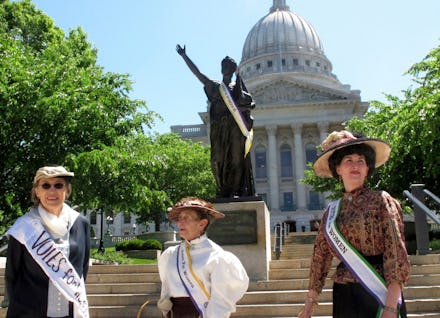A conservative law group might strip 200,000 Wisconsin residents of the vote

In yet more troubling news for voting rights, a Wisconsin judge has ordered that 200,000 people be stripped from the voter rolls in the Badger State. Democrats declared that this decision is voter suppression in action — especially in a state where elections are often decided by far smaller numbers of voters. In 2016, Donald Trump won Wisconsin by only 23,000 votes.
The lawsuit that led to this decision dates back to October, when the Wisconsin Elections Commission contacted 234,000 voters it believed to have moved and asked them to provide new registration information. The state agency did so by mailing the individuals a letter asking that they confirm their address.
Then the Wisconsin Institute for Law & Liberty (WILL), a conservative legal group, filed a lawsuit arguing that the voters should only have 30 days to confirm their addresses before being purged from the voter rolls. They asked a judge to require that election officials follow through with the purge.
Now, Republican-appointed county circuit judge Paul Malloy has weighed in. In his ruling, handed down Friday, Malloy said that election officials do in fact have to strip voters from the rolls in the next 30 days.
“I don’t want to see someone deactivated, but I don’t write the law,” wrote Malloy, according to The Guardian. “There’s no basis for saying 12 to 24 months is a good time frame. It’s not that difficult to do it sooner … If you don’t like [it], you have to go back to the legislature.”
Back in June, the Wisconsin Elections Commission adopted a new policy in which voters would have a grace period of 12 to 24 months after failing to respond to a letter asking for a confirmation of their address before their registration would be invalidated. This would have allowed the voters in question to maintain their registration through the 2020 election.
WILL’s lawsuit asserts that this is in violation of a state law that declares, “If the elector … fails to apply for continuation of registration within 30 days of the date the notice is mailed, the clerk or board of election commissioners shall change the elector's registration from eligible to ineligible status.”
Following Malloy’s ruling, the Wisconsin Elections Commission said in a statement that it would meet to decide on “next steps.” The president of WILL, Rick Esenberg, celebrated the decision, saying that “this case is about whether a state agency can ignore clearly written state law. Today’s court order requires the Wisconsin Elections Commission to follow state law, and we look forward to making the case that they must continue to follow state law.”
Lawyers for the League of Women Voters and the Wisconsin Elections Commission asked Malloy to stay the ruling while they appeal his decision. The stay would have prevented any voters from being purged for the time being, while the Commission figured out a path forward. He declined to do so.
The Milwaukee Journal Sentinel reports that the purge will disproportionately affect Democratic areas. Democratic-leaning cities Milwaukee and Madison received 23% of letters sent out while containing only 14% of the state’s total voters.
“Here they go,” tweeted former Attorney General Eric Holder, who worked under President Barack Obama. “Voter purge in Wisconsin that disproportionately targets Democrats, people of color, and those who voted for Hillary in 2016. The expected unfairness. Fight this Wisconsin! Fight for a fair election.”
This decision is part of a larger right-wing strategy of targeting voters by forcing them to go through onerous, confusing steps, like responding to a letter from an elections board that many may not have even seen. After all, if the agency suspected the voters of having outdated mailing addresses, would mailing a notice to the address on file really be productive? It’s an example of secondhand disenfranchisement, using dense bureaucratic wrangling as a tool to keep people from voting. It preys on those without the time or knowledge to fight back, and especially hurts underprivileged communities.
“I won the race for governor by less than 30,000 votes,” tweeted Wisconsin’s Democratic Gov. Tony Evers, underscoring the razor-thin margins in Wisconsin. Malloy’s order could remove nearly 200,000 Wisconsin residents from the voter rolls.
The move is “just another attempt at overriding the will of the people and stifling the democratic process,” Evers said. “Voting is a fundamental right, and we should be making it easier for folks to vote, not harder.”